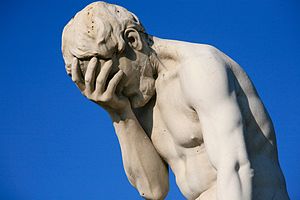In his 1802 book titled Natural Theology, or Evidences of the Existence and Attributes of the Deity Collected from the Appearance of Nature, Anglican Priest and philosopher William Paley made the classic teleological "argument from design" in his famous Watchmaker analogy, which says: In crossing a heath, suppose I pitched my foot against a stone, and asked how that stone came to be there; I might possibly answer that, for anything I knew to the contrary, it has lain there forever. Nor would it perhaps be very easy to show the absurdity of this answer. But suppose I have found a watch upon the ground, and it should be inquired how the watch happened to be in that place; I should hardly think of the answer, which I had before given, that for anything I knew, the watch might have always been there.... The watch must have had a maker: that there must have existed, at some time, and that some place or other, and artificer or artificers, who formed it for the purpose which we find it actually to answer; who comprehended its construction and designed its use.... Every indication of contrivance, every manifestation of design, which existed in the watch, exists in the works of nature; with the difference, on the side of nature, of being greater or more, and that in a degree which exceeds all computation. Granted, rebuttals have been attempted in response to Paley’s argument for Intelligent Design, but the question is: can these counterarguments actually challenge a modernized version of Paley's Watchmaker with any real success? It seems to me that all of these counterarguments … [Read more...]
How did I get here?
The title poses what is known as an existential question -- questions that are much easier asked than answered. Who am I? What happens when we die? Is there a purpose for my life? Existential questions are the sort that you're never completely sure that you've really solved them, until you die. The answers that you decide are most correct will often determine whether or not you believe in God, which may impact many of the life decisions you make. So these are not trivial questions...in fact, they are the most important and difficult questions that we may ever contemplate. How in the hell did I get started writing books that talk about things related to religion and science, when I only received a business degree in college? That's also an excellent question, and an easier riddle to solve because the question itself isn't existential in nature. And this is my answer... I've always loved writing, whether it was source code for computer programs, a short story, or an effort to communicate important thoughts and ideas in concise language through documents I've written. I've always enjoyed tackling difficult problems and then working diligently to solve them. One of my earliest dreams was to become a professional writer one day. However, for the longest time, I was too busy working a full-time job and raising my family to write prose on the side, or to worry much about seeking answers to my existential questions. I had things to do, and people to see. I stayed busy. Then a fateful television interview that was mostly background noise while I worked … [Read more...]
The end of a delusion
My career as a writer was inspired by the word delusion, more than any other word which can be found in the dictionary. Delusions are defined as "fixed false beliefs or opinions" that are resistant to reason even when confronted by actual facts. For this reason, the term is frequently used to describe symptoms of mental illness. The book The God Delusion by renowned atheist and biologist Richard Dawkins was the inspiration for my first published book, Divine Evolution, after I heard Dawkins say in an interview that cars, computers, and even his book were all intelligently designed, but human beings were not. I still haven't gotten over the absurdity of his comment -- I began learning about computers while matriculating as a student at UGA, which was followed a long career as a software developer before becoming a professional writer. So I am well aware that the capabilities of an "intelligent designed" computer actually pales in comparison to the human brain, that DNA is exponentially more complex than computer machine language, and that the "software" that operates the human body works independently of our conscious brain is infinitely more complex than the source code for Google's search engine. Richard Dawkins made it crystal clear in his book that he believes supernatural phenomena does not exist. According to him, only the "real" or material world exists -- no gods, devils, ghosts, angels, or demons. No miracles, no answered prayers. Of course, I couldn't write Divine Evolution until I'd done quite a bit of research into the science of evolution … [Read more...]
Face Palm Sunday
Yesterday was Palm Sunday. The face palm moment came early. Before church, I visited a place on Facebook called The Battlefield. The group consists of theists and atheists who are interested in (more or less) cordial debate. I felt compelled to respond after one of my atheist friends asserted if Sir Isaac Newton were alive today, he would reject Young Earth Creationism and more than likely be an atheist, according to these statistics. Several replies came to mind. Naturally, I responded with all of them. First of all, such speculation is both silly and irrelevant. Newton has been dead almost 300 years. It's impossible to say what he would be like today. And it seems rather foolish to assume modern science would be anywhere close to where it is today if Newton hadn't lived and accomplished what he did, when he did. The issue of Young Earth Creationism is semantic, and especially for this argument. It can help divide Christians from each other, but does not separate theists from atheists, the more important point of contention in that forum. Secondly, historically speaking, the polar opposite has been true in regard to the relationship between super-intellect and spiritual beliefs. Polymaths like Newton, da Vinci, and Emmanuel Swedenborg were if anything uber-religious people, and most certainly not atheists. Modern polymath Michael Guillen has three PhDs, and he's a Christian. The appeal to modern authority falls flat because Newton was the authority of his time. If he were alive today, it would be reasonable to assume that Newton would still be an authority … [Read more...]



